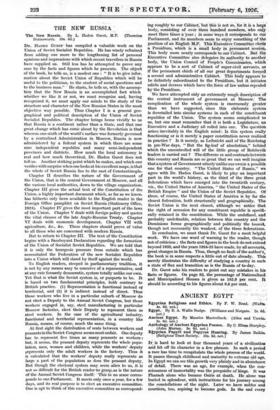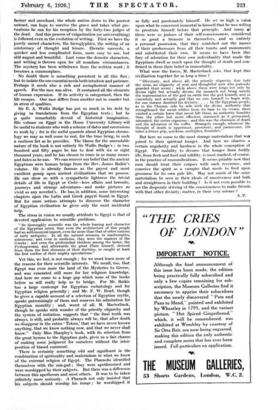ANCIENT EGYPT
Egyptian Religions and Ethics. By F. W. Read. (Watts. 4s. 6d. net.) Anthology of Ancient Egyptian Poems... By C. Elissa She/piny. (John Murray. 3s. 6d. net.)
Egyptian Papyri and Papyrus Hunting. By James Baikiei (Religious Tract Society. 10s. 6d. net.)
IT is hard to look at four thousand years of a civilization and hit off its character in a few phrases. In such a period a race has time to recapitulate the whole process of the world. It passes throUgh childhood and maturity to extreme old age. In Egypt we can see this growth very plainly and in abundance of detail. There was an age, for example, when the Con- sciousness of immortality was the perquisite of kings. It was Pharaoh alone who became Osiris at death. He .alone was buried in splendour, with instructions for his journey among the constellations of the night. Later we have nobles and courtiers, too, aspiring to become gods. In the end every
farmer and merchant, the whole nation down to the poorest outcast, can hope to survive the grave and takes what pre- cautions he can for his reception by the forty-two judges of the dead. And this process of vulgarization (or universalizing) is followed even in the evolution of writing. First we have the purely sacred charaCters, the hieroglyphics, the writing of an aristocracy of thought and leisure. Hieratic succeeds, a quicker and less complicated, form, more easy to use, but
still august and heautiful. Last come the demotic characters, and writing is thrown open for all mundane circumstances.
The myitery has been withdrawn from the written word ; it becomes a commonplace.
No doubt there is something persistent in all this flux ; but to isolate the one essential needs both intuition and patience. 'Perhaps it needs also a rich and metaphorical manner of speech. For the race was alive. It contained all the elements
of human expression. If its activity is categorized, then the life escapes. One race differs from another not in number but in stress of qualities.
Sir E. A. Wallis Budge has put us much in his debt by giving us translations from the Egyptian texts ; but he
is quite remarkably devoid of historical imagination. His volume on Egypt in the Home University Library will
be useful to students who wish a scheme of dates and successions to work by ; for in the awful quarrels about Egyptian chrono- logy we may as well come to rest, for the time being, in such a cautious list as he provides. The blame for the unreadable nature of the book is not entirely Sir Wallis Budge's ; in two hundred and fifty pages he has to deal with six or eight thousand years, and he has chosen to cram in as many names and dates as he can. We can recover our belief that the ancient Egyptians were human beings from the Rev. James Baikie's volume. He is already famous as the gayest and most excellent gossip upon ancient civilizations that we possess. He can show us with a sympathetic lightness the trivial details of life in Egypt or Crete—love affairs and lawsuits, journeys and strange adventures—and make pictures as vivid as any novelist's. He has, in addition, some interesting ehapters upon. the Latin and Greek papyri found in Egypt.
But for more serious attempts to discover the character of Egyptian civilization he gives only the most incidental help.
The stress in vision we usually attribute to Egypt is that of devoted application to scientific problems.
" So thoroughly scientific was the whole leaning and character of the Egyptian mind, that even the, architecture of this people had an astronomical import, even far more than that of other nations of early antiquity. In all the natural sciences, in mathematics, astronomy, and even in medicine, they were the masters of the Greeks ; and even the profoundest thinkers among the latter, the Pythogoreans, and afterwards the great Plato himself, derived from them the first elements of their doctrine, or caught at least the first outline of their mighty speculations."
Yet this, we feel, is not enough ; for we must learn more of the reasons for their scientific interests. We recall, too, that
Egypt was even more the land of the Mysteries to Greece, and was venerated still more for her religious knowledge. And here we come to a huge gap which none of the books before us will really help us to bridge. For Mr. Baikie has a large contempt for Egyptian eschatology and for Egyptian religion generally ; and Mr. F. W. Read, though he gives a capable account of a selection of Egyptian myths, speaks patronizingly of them and reserves his admiration for Egyptian morality ; and, worst of all, M. Maeterlinck, though he speaks with wonder of the priestly oligarchy and the system of initiation, suggests that " the final truth was always, is still, and probably always will be, that after death we disappear in the entire ' Totem,' that we have never known anything, that we know nothing now, and that we never shall know." Only Miss Sharpley's book, with its selection from the great hymns to the Egyptian gods, gives us a fair chance of making some judgment for ourselves without the inter- position of biased comment.
There is certainly something odd and significant in the combination of spirituality and materialism in what we know of the external religion of Egypt. The Pharaohs identified
themselves with the gun-god ; they were apotheosized and were worshipped by their subjects. But there was a difference between this apotheosis and most others. It was to be taken infinitely more seriously. A Pharaoh not only insisted that :his subjects should worship his image ; he worshipped it
as fully and passionately himself. He set so high a value upon what he conceived immortal in himself that he was willing to prostrate himself before that principle. And many of them were so jealous of their self-consciousness, considered it so great a treasure in themselves, and so entirely a personal possession, that they scratched out the names of their predecessors from all their tombs and monuments and substituted their own. It seems to have been this fury of adoration for their own individuality that made the Egyptians dwell so much upon the thought of death and con- firmed in them their belief in immortality.
What were the forces, M. Maeterlinck asks, that kept this civilization together for so long a time ?
" Obviously, and above all, the priestly oligarchy that held the reins, an oligarchy of wise and thoughtful men who jealously guarded their secret ; while above them were kings not only by divine right but actually divine, the monarch not being merely the representative of the god on earth but the god himself, and so concretely and actually god that no one, himself to begin with, for one instant doubted his divinity. . . . In the Egyptian people, as in the Chinese, side by side with the divine authority that strengthened the social edifice from its base to its crown, there existed a certain force that never left them, an authority humbler than the other but more effective, inasmuch as it permeated, saturated, the entire organism ; and this was the obsession of death and the adoration of the coffin. Strangely enough, wherever the thought of death is uppermost, persistent, and paramount, life takes a firmer grip, quickens, multiplies, flourishes."
But here we come to the most strange materialism that was
joined to their spiritual hunger. And here we observe a certain angularity and hardness in the whole conception of Egypt. The inability to divorce that hunger from bodily life, from flesh and food and solidity, is most marked, of course, in the practice of mummifications. It seems pitiable now that men should treat their corpses with such reverence, and conceive the spirit as a vampire that needs to feed upon grossness for its own pale life. May not much of the same materialism be seen in their ideals of massiveness and bulk and straightness in their building ? Is it not even possible to see the desperate striving of the consciousness to make friends with that other divinity, matter, in their very science ?
A. P.



























































 Previous page
Previous page